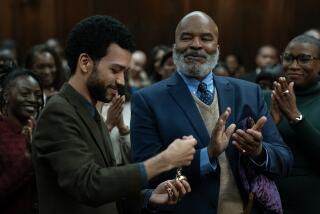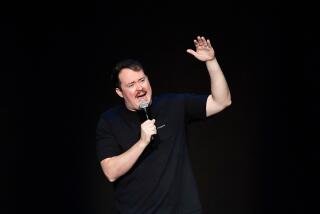For ‘Get Hard’ director, race-themed satire is a tricky enterprise
At the SXSW Film Festival premiere of “Get Hard,” an audience member stood up and challenged director Etan Cohen, angrily proclaiming that the R-rated comedy’s riff on black-white assumptions was racist.
As the Kevin Hart-Will Ferrell movie opens this weekend, it remains to be seen how many others share his view.
But the very fact of the debate illustrates the challenge in the current climate of making a commercial comedy, let alone one about a topical or sensitive subject. Comedy filmmakers, in search of fresh laughs, seek new ways to test the taste line -- a development that comes even as media reacts faster and louder to perceived offenses.
Cohen and one of the film’s stars have said their intentions were to send up racism, not reinforce it.
“I hope people recognize the stereotypes on both sides,” Cohen said in a recent interview. “We all have assumptions or fears we’re afraid to have conversations about. I just think when you bring it to light it’s a good thing. It’s much healthier to have people think about it than not think about it.”
The film examines what happens when James (Ferrell), a dandyish hedge-fund manager bound for a long prison stay for white-collar crimes, hires the car-wash employee Darnell (Hart) to prepare him for prison, based on James’ wildly mistaken assumption that Darnell’s race and blue-collar job means he’s done time himself.
The movie features a number of jokes that play on how Hart and Ferrell view each other and other races generally, with the centerpiece an extended riff in which Darnell imagines to James how the latter will be caught between various ethnic factions in the prison yard. Hart’s character proceeds to impersonate the ethnicities in a definitive manner.
As Charlie Hebdo demonstrated, satire is a tricky beast, and the line between taking comedic jabs at others’ views and offending those who hold them can be tricky.
It’s perhaps even more daunting here given the movie’s meta ambitions. Hart and Ferrell are trading in comedy that is meant to provoke laughter not at their ostensible targets but at the characters for making those jokes in the first place, yet many might laugh at the targets as well.
Some early pundits have said the movie falls far short of making this distinction. “Finally, a comedy that homophobes, racists and generally stupid people can all enjoy together!” said a writer on the ComingSoon.net blog.
For their part, the filmmakers say they’re aware of the pitfalls.
“When you’re doing satire people can be confused about what you’re actually satirizing,” Cohen said. “That happened on [Cohen’s former show] ‘Beavis and Butt-head.’ People would say, ‘How could you have them do that?’ But they didn’t get that they’re not heroes — you’re not supposed to want to be like them. When Kevin is doing those jokes in that [prison yard] scene, he’s stereotyping; he has no idea what really happens. He’s watching ‘Oz’ and getting all his ideas from that show.”
Cohen said he and studio Warners Bros. went to great lengths to be sensitive, drawing on an extensive testing process with mixed audiences to see how different groups might perceive the same joke.
He also said that on set he would sometimes ask Hart how he thought specific lines might play in the black community, and Hart would sometimes offer a bit of nuance that the filmmakers hadn’t thought of. “There were a couple moments where he said, ‘I don’t how this will be perceived,’” Cohen said. “And so we changed it.”
Hart said that he feels the movie, for all its race-themed jokes, shows the value of understanding.
“It’s almost putting these stereotypes in your face and making you realize how ridiculous these assumptions are,” the actor said in an interview. “This is a movie that deals with that first-hand. These are two people who completely stereotype one another, and when they put themselves in a situation where they get to know the other, they find out about the genuine person underneath.”
Audiences will of course make up their own minds on these charged questions. (Incidentally, there is also the matter of how viewers will respond to the movie’s tackling of homosexual issues; there are a large number of prison rape jokes and one provocative scene in a gay bar as Darnell seeks to acclimate James to performing oral sex on another man.)
Reading that fan reaction, though, can offer its own trickiness. Twitter is conducive to disproportionate responses; within a few hours of the SXSW heckler’s comments, news sites had posted on the incident and social media had reverberated them around the country, lending one audience member’s view an outsized importance.
Cohen said he was prepared for reactions to run the gamut and include some criticism as well.
“We wanted to go at these things head-on. There are stereotypes we’re aware of, and we just want to undercut them,” Cohen said. When asked about those who might take the jokes at face value and use it to validate negative beliefs, he said, “It’s hard — you can’t avoiding certain people thinking a certain way, and then those stereotypes will become reinforced. But I also know you’re never going to convert those people.”
Twitter: @ZeitchikLAT
More to Read
Only good movies
Get the Indie Focus newsletter, Mark Olsen's weekly guide to the world of cinema.
You may occasionally receive promotional content from the Los Angeles Times.







